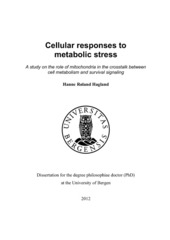| dc.contributor.author | Hagland, Hanne | en_US |
| dc.date.accessioned | 2013-01-10T12:03:11Z | |
| dc.date.available | 2013-01-10T12:03:11Z | |
| dc.date.issued | 2012-08-31 | eng |
| dc.identifier.isbn | 978-82-308-2092-6 | en_US |
| dc.identifier.uri | https://hdl.handle.net/1956/6259 | |
| dc.description.abstract | Metabolic imbalance is associated with increased risk of several diseases, including cancer. Metabolism affects or is affected by virtually all other cellular processes, which is not surprising considering their conserved role throughout evolution. Mitochondria are important sensors of the intracellular metabolic environment and play a major role in bioenergetics and survival signaling in mammalian cells. Accordingly, these cell organelles have been implicated in the development of cancer, which includes changes in cellular metabolism and cell death signaling. Metabolic reprogramming in cancer cells increases cell growth and proliferation. This entails greater nutrient uptake which is metabolized to provide energy and intermediates for cell constituents. This reprogramming has generally been associated with increased therapeutic resistance, but may also prove to be utilized in metabolic targeted therapies. Major signaling networks that are involved in tumor growth and metabolic reprogramming are PI3K/Akt/mTOR signaling pathways often found mutated in cancer cells. Activation of this pathway results in high glucose dependency and aggressive tumors. On the other hand, the activation of a lowenergy- responsive AMP-activated protein kinase (AMPK) signaling pathway leads to growth inhibition. Both of these signaling pathways may regulate or be regulated by mitochondrial functions, which has been the basis of this Ph.D study. The aim of this work was to investigate interactions between cell metabolism and signalling that affect mitochondrial function under conditions of energetic and metabolic stress. In order to reflect different contexts of mitochondrial regulation, we studied these mechanisms in both metabolically restricted cancer cells, as well as metabolically flexible primary rat hepatocytes. We found that leukemia cells that have mutations in the PI3K/Akt/mTOR signaling pathway (Jurkat) were more susceptible to glucose deprivation and agents that challenge this metabolism (such as palmitic acid). Alternatively, leukemia cells that use more oxidative phosphorylation for their metabolism (HL-60) showed increased resistance to glucose deprivation, but higher susceptibility to agents interfering with their mitochondrial function (such as resazurin and AICAR). Metabolically flexible primary cells (hepatocytes) were found to adjust their metabolism in response to agents that induce increased metabolic stress (TTA). Interestingly, this involved the nutrient sensing mTOR signaling pathway, which may play a role in regulating cell size, whereas we found no indications of hyperplasia (no neoplastic growth of the liver). These studies support the growing understanding that metabolic characterization of cancer cells and its effects on and by mutations in cell signalling pathways, not only gives us a better understanding of tumour biology, but may also provide additional treatment targets and strategies in cancer therapy. It is thus a possibility that treatments targeted to metabolism cause cell stress and death in metabolically compromised cancer cells, while more benign reversible stress responses may occur in normal cells. | en_US |
| dc.language.iso | eng | eng |
| dc.publisher | The University of Bergen | eng |
| dc.relation.haspart | Paper I: Erikstein BS, Hagland HR, Nikolaisen J, Kulawiec M, Singh KK, Gjertsen BT, Tronstad KJ. Cellular stress induced by resazurin leads to autophagy and cell death via production of reactive oxygen species and mitochondrial impairment. Journal of Cellular Biochemistry 111(3): 574–584, October 2010. Full text not available in BORA due to publisher restrictions. The article is available at: <a href="http://dx.doi.org/10.1002/jcb.22741" target="blank"> http://dx.doi.org/10.1002/jcb.22741</a> | en_US |
| dc.relation.haspart | Paper II: Hagland HR, Nikolaisen J, Nilsson LIH, Pettersen IN, Omsland M, Strand I, Myklebust R, Gjertsen BT, Bruserud Ø, Lorens JB, Døskeland SO, Tronstad KJ. Modulation of mitochondrial energy metabolism leads to respiratory dysfunction and metabolic stress via cell specific pathways in leukemia cells. Full text not available in BORA. | en_US |
| dc.relation.haspart | Paper III: Hagland HR, Nilsson LIH, Burri L, Nikolaisen J, Døskeland SO, Berge RK, Tronstad KJ. The pan-PPAR activator tetradecylthioacetic acid (TTA) increases mitochondrial respiration and hypertrophy in rat hepatocytes involving the mTOR/4E-BP1 pathway. Full text not available in BORA. | en_US |
| dc.relation.haspart | Paper IV: Hagland H, Nikolaisen J, Hodneland LI, Gjertsen BT, Bruserud O, Tronstad KJ. Targeting mitochondria in the treatment of human cancer: a coordinated attack against cancer cell energy metabolism and signalling. Expert Opinion on Therapeutic Targets 11(8): 1055-1069, August 2007. Full text not available in BORA due to publisher restrictions. The article is available at: <a href="http://dx.doi.org/10.1517/14728222.11.8.1055" target="blank"> http://dx.doi.org/10.1517/14728222.11.8.1055</a> | en_US |
| dc.title | Cellular responses to metabolic stress. A study on the role of mitochondria in the crosstalk between cell metabolism and survival signaling | en_US |
| dc.type | Doctoral thesis | |
| dc.rights.holder | Copyright the author. All rights reserved | |
